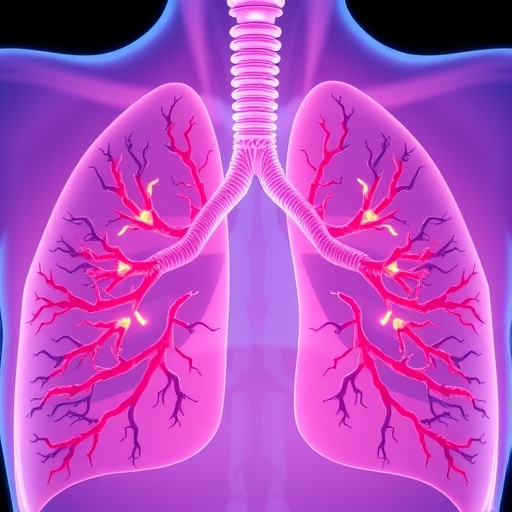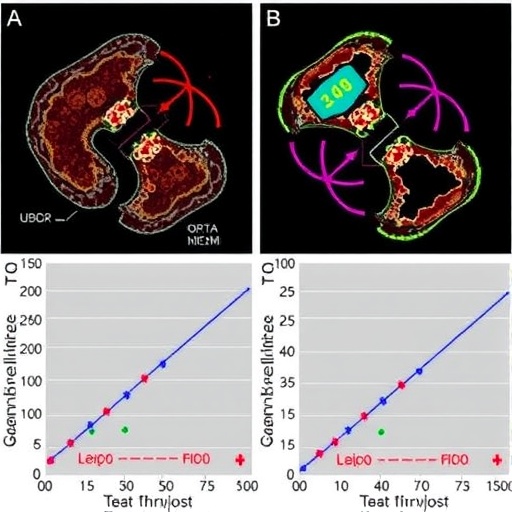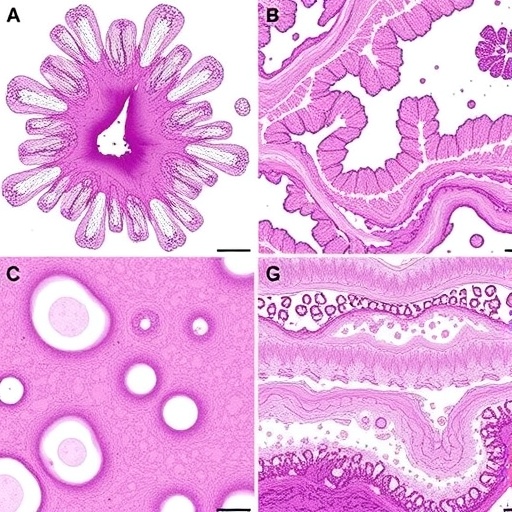PROTECT YOUR DNA WITH QUANTUM TECHNOLOGY
Orgo-Life the new way to the future Advertising by AdpathwayA groundbreaking study presented at the American Society for Radiation Oncology (ASTRO) 2025 Annual Meeting has provided novel insights into the management of limited-stage small cell lung cancer (LS-SCLC). This latest research from the NRG Oncology group, specifically the NRG-LU005 clinical trial, investigates the integration of immunotherapy with the current standard of care—concurrent chemoradiation. Though prior analyses from this trial revealed no improvement in overall survival (OS) with the addition of atezolizumab, a PD-L1 checkpoint inhibitor, a deeper dive into patient-reported outcomes (PROs) offers new evidence that could reshape therapeutic approaches in this challenging disease.
Small cell lung cancer, especially in its limited stage, poses significant treatment challenges due to its aggressive nature and rapid progression. The standard-of-care protocol involves chemoradiation therapy employing thoracic radiotherapy combined with platinum-based chemotherapy. The NRG-LU005 trial was designed to evaluate whether adding atezolizumab concurrently and as an adjuvant therapy may improve not only survival outcomes but also the quality of life (QOL) for patients enduring this demanding regimen. The trial randomized 544 patients to receive either chemoradiation alone or with concurrent and adjuvant atezolizumab. Radiation therapy schedules included twice-daily radiotherapy at 45 Gy or once-daily at 66 Gy, though the randomization did not encompass radiation schedule assignment.
The primary endpoint of the trial, overall survival, did not show a statistically significant benefit from the addition of atezolizumab. However, an intriguing exploratory analysis pointed to a notable survival advantage in patients who underwent twice-daily radiation compared to once-daily radiation schedules, despite the lack of randomization between these two modalities. Building on these findings, the recent PRO analysis focused on assessing the longitudinal quality of life in these patients using validated instruments such as the Functional Assessment of Cancer Therapy – Trial Outcome Index (FACT-TOI), EQ-5D-5L, and PROMIS-Fatigue.
Compliance with PRO assessments remained impressively high, exceeding 85% at baseline and stabilizing to approximately 60-68% across a 21-month follow-up period post-chemoradiation. This level of engagement, especially in a population experiencing intensive treatment and disease burden, underscores the relevance and reliability of these patient-centered data. As anticipated, patients reported a decline in FACT-TOI scores during active chemoradiation, indicative of the acute toxicities and symptomatic burden associated with simultaneous chemotherapy and radiation. Encouragingly, recovery trajectories showed improvement by the three-month post-treatment mark, with stabilization or even surpassing of baseline QOL scores observed from six months onward.
Strikingly, fewer patients in the atezolizumab arm experienced clinically meaningful decline (CMD) in quality of life at 21 months compared to those receiving chemoradiation alone (25% versus 38%). This finding points toward a potential additive benefit of immunotherapy in ameliorating longer-term treatment-related decrements in patient wellness, which may not be directly reflected in survival statistics alone. Furthermore, the twice-daily radiation cohort demonstrated relatively superior QOL outcomes over time compared to the once-daily radiation group. Multivariable analyses adjusting for confounders corroborated these observations, lending credence to the hypothesis that twice-daily treatment schedules might confer qualitative advantages without compromising efficacy.
Dr. Benjamin Movsas, the principal quality of life investigator for the NRG-LU005 study and Medical Director at Henry Ford Cancer in Michigan, highlighted the significance of these results from a patient-centered perspective. He emphasized that although the trial was not designed to randomize radiation fractionation schedules, the association of twice-daily radiation with enhanced QOL metrics underscores the importance of considering patient-reported outcomes in treatment design. These data reinforce the acceptability and potential preference for accelerated radiation regimens in LS-SCLC, which historically have been underutilized in clinical practice despite prior indications of improved survival.
The NRG-LU005 trial leveraged a comprehensive and methodologically rigorous approach to capturing patient-reported outcomes, ensuring that the nuanced impacts of therapy beyond traditional clinical endpoints are recognized. The integration of FACT-TOI, EQ-5D-5L, and PROMIS-Fatigue instruments provided a multidimensional evaluation encompassing physical, emotional, and functional domains, reflecting the holistic experience of LS-SCLC patients undergoing intensive multimodal therapy. This approach aligns with emerging oncology paradigms prioritizing not only prolongation of life but also preservation and enhancement of its quality.
Of particular technical interest, the study’s analysis delineated the temporal patterns of QOL changes, substantiating the transient nature of acute treatment toxicities during chemoradiation followed by encouraging recovery phases. The identification of a lower frequency of clinically meaningful QOL deterioration in the immunotherapy arm suggests immunomodulatory treatments might mitigate some long-term sequelae of concurrent chemoradiation. Mechanistically, this could relate to modulation of systemic inflammatory responses or immune-related effects on tumor and normal tissue homeostasis, warranting further translational investigation.
The trial’s funding was supported by the National Cancer Institute and Genentech, facilitating the execution of this large-scale, multi-institutional study. NRG Oncology’s broad network of over 1,300 research sites worldwide was instrumental in achieving high accrual rates and maintaining robust data quality, exemplifying the power of collaborative clinical research in oncology. This infrastructure allows for definitive evaluation of complex treatment interventions and their impact on diverse patient populations, advancing the standard of care.
Importantly, these findings may influence future clinical guidelines and patient counseling practices in LS-SCLC. The demonstration of quality of life benefits with twice-daily radiation and concurrent immunotherapy provides a compelling rationale for incorporating patient-centered endpoints in clinical trial design and treatment decision-making. It also urges consideration of twice-daily radiation schedules, often avoided due to logistical challenges, as a viable option that may offer tangible advantages from the perspective of those receiving therapy.
In conclusion, while overall survival gains remain elusive in this setting, the NRG-LU005 patient-reported outcomes analysis marks a pivotal step in understanding how therapeutic regimens influence quality of life over the long term for limited-stage small cell lung cancer patients. These nuanced insights enhance the precision of clinical practice, balancing efficacy with patient experience. Ongoing research is necessary to optimize integrated treatment strategies further and to elucidate the biological underpinnings of observed QOL differences, ultimately striving to improve both quantity and quality of survival.
Subject of Research: Limited-stage small cell lung cancer treatment; integration of immunotherapy with chemoradiation; patient-reported outcomes and quality of life analysis.
Article Title: Comprehensive Patient-Reported Outcomes from NRG-LU005: Evaluating Chemoradiation with and without Atezolizumab in Limited-Stage Small Cell Lung Cancer
News Publication Date: September-October 2025
Web References:
– NRG Oncology Podcast: https://www.nrgoncology.org/Podcast
– NRG Oncology Homepage: http://www.nrgoncology.org
References:
Movsas B, Hu C, Higgins KA, Ross HJ, Jabbour SK, Kozono DE, Owonikoko TK, Xiao C, Shoji T, Faller BA, Mohindra P, Dib EG, Brownstein JM, Chun SG, Kuzma CS, Kotecha RR, Onitilo AA, Paulus R, Bradley JD, Bruner DW. Comprehensive Patient Reported Outcomes (PROs) from NRG LU005: A Randomized Trial Of Chemoradiation (CRT) +/- Atezolizumab In Limited-Stage Small Cell Lung Cancer (LS-SCLC). Paper presented during the Late Breaking Abstract Session at the annual meeting of the American Society for Radiation Oncology. San Francisco, CA. (2025, September-October).
Keywords: Small cell lung cancer, limited-stage, chemoradiation, atezolizumab, immunotherapy, patient-reported outcomes, quality of life, thoracic radiotherapy, twice-daily radiation, concurrent therapy, clinical trial, NRG Oncology
Tags: aggressive lung cancer managementASTRO Annual Meeting 2025atezolizumab in cancer treatmentchemoradiation therapy standardsimmunotherapy in lung cancerlimited-stage small cell lung cancerNRG Oncology clinical trialonce-daily radiation therapypatient-reported outcomes in cancerQuality of Life Improvementthoracic radiotherapy protocolstwice-daily radiation therapy


 4 hours ago
9
4 hours ago
9





















 English (US) ·
English (US) ·  French (CA) ·
French (CA) ·